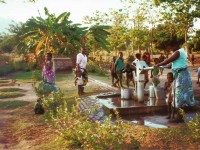Topics: Urban Sustainability
Location:Kalembo and Liwonde regions, Malawi
Organizers: KfW
Background: In developing countries, cities with high urbanization rates, peri-urban demand for water grows quickly and is many times satisfied through legal and illegal drilling of boreholes, such as in Sana’a, Yemen. Without proper management, uncontrolled borehole water withdrawal can increase public health risks and endanger the sustainability of water resources. An important component of borehole management is to help communities that rely on boreholes rehabilitate pumps and wells as a first step to fostering willingness to participate in borehole monitoring and management.
Project: The Kalembo Groundwater Project (KGP), implemented by KfW for 120,000 inhabitants of the Kalembo / Liwonde region between 1994 and 1999, constructed or repaired 370 wells and equipped them with hand pumps.
To ensure properly maintained wells with equitable access, the project focused on training water committees to effectively manage the well and its pump system, from operation and maintenance to money-handling and record-keeping.
Twelve months before construction, communities were notified about the well-upgrading so that households around the site of a borehole could form user groups. User groups elected a 10-member water committee, comprised typically of six women and four men.
The water committee became responsible for managing the hard and soft aspects of the well and pump resources. Four members were trained to make basic repairs to the pump. Committees learned community management techniques, such as conducting user meetings, managing money and keeping records. A sanitation education program was instituted. Water committees then became the liaisons between water users, local authorities and maintenance personnel. They also administered disputes over the well and oversaw the inclusion of new users into user groups. By integrating stakeholders into every aspect of the project, the project resulted in enduring investments.
Results: Management practices contributed significantly to the sustainability of the project: four years after completion, 97% of wells were still functioning with an average well downtime of just two days; 100% of water committees were still active, and 99% had spare funds available for repairs.
Sources: http://pdf.usaid.gov/pdf_docs/PNACP702.pdf
http://www.watsan.org/docs/afridev-in-malawi,-hankins.pdf
http://www.gitec-consult.com/Blb/W/08We.pdf
Kalembo, Malawi Groundwater Project

